---------------------------------------------------------
Humans have been using herbs for culinary & health benefits for as long as history has been recorded. Just like humans, wild birds have been observed gathering herbs for their nest or sampling them straight from your garden. So it should come as no surprise that herbs can also have a beneficial effect on your flock.
The great news is most herbs are insanely easy to grow – no green thumb is required. Most are not very finicky about their soil and can live on less water & sun than some other members of your vegetable garden. Many herbs are perennials so once you have the plant established it will continue to provide for your flock for years to come.
How can you use herbs with your chickens? The answer will depend on the herb and the benefit you are looking for. Before introducing your chickens to a new plant, be sure it is one that is safe to use with poultry.
Almost all common culinary herbs are safe for chickens. The only herb I am aware of that is toxic is pennyroyal. But there are so many I hate to say they are all safe! I have read conflicting reports on the safety of coriander with chickens, but have no personal experience with it. Herbs that are definitely on the “good” list include oregano, thyme, parsley, basil, mint, dill, sage, marjoram, lavender, calendula, cilantro, garlic, tarragon and so many more.
How to use herbs with your flock & in your coop
You can give the herbs to your chickens fresh for eating by either hanging a bunch and letting them pick at it, or by mixing it into their feed. Another option is to use herbs for chicken aromatherapy by hanging aromatic herbs in bunches around the coop. You could also mix them into their dust bath or sprinkle them in the nest box.
When adding herbs to your coop you can use them either fresh from the garden or dried as a potpourri. If you are hanging a bunch of fresh herbs in the coop, it’s fine to leave them up indefinitely. If you are sprinkling them in the bedding/nest boxes it’s best to remove any leftovers after a week during your normal cleaning routine so they don’t begin to mold and decompose in the coop.
As much as I love using herbs with my flock, I do not think they replace good chicken husbandry. I think of them as an additional, important tool to help keep my chickens happy & healthy naturally. Hanging mint around your coop alone does not make for an effective pest management system, but it can be part of it. Feeding your chickens oregano does not replace good quality feed, but it can be part of a high-quality diet. Adding mint & lavender to your next boxes or coops doesn’t mean you can get away with not cleaning them, but it will make them smell better between cleanings.
You can buy pre-made nesting box dried herb mixes or find herb mix recipes online. What I generally do is just harvest whatever is growing in abundance in my garden at the time and use that. Many of the herbs your chickens enjoy, you will also find useful for cooking or healing so growing a herb garden is really a win-win!
My Favorite 6 Herbs to Grow for Chickens

Mint
If you can only grow one herb for your chickens I would recommend mint. It has so many uses and is SO easy to grow! My chickens, ducks, & rabbits all love to eat mint. Mint has a cooling, refreshing effect so is a good addition to water on hot days. In the summertime, I will float some crushed mint leaves in iced water for a refreshing drink. The smell also has a calming, de-stressing effect, making it a great choice to add to nest boxes or dust bathing areas.
Mint can act as a natural insect & rodent deterrent because they dislike the strong smell. Try hanging bunches of fresh mint around the run to discourage flies or planting mint around the outside of the run to discourage rodents. Be careful where you plant mint though because it spreads really quickly. If you have some space you don’t mind filling in a garden, plant one mint plant and it will be 8-9 plants by next year and will keep coming back year after year. If you want to keep it contained, it grows beautifully in containers too. There are dozens of varieties of mint; peppermint & spearmint are two popular choices, but lemon balm, chocolate mint, and cat mint are also great.
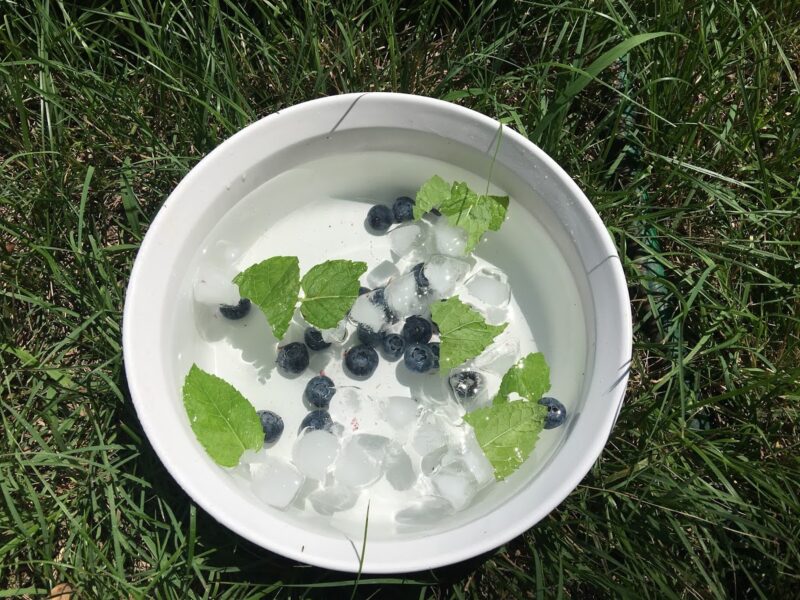
Oregano
Well known for its antibacterial & anti-parasitic properties, oregano is also chock full of vitamins, calcium, & antioxidants. It also supports a healthy immune & respiratory system (and tastes great in your recipes!). Chop fresh oregano leaves and mix them into the chicken feed or hang bunches in the run for them to pick at. Oregano is another easy-to-grow herb. It is a perennial but doesn’t spread the way mint does. The plant will get larger and larger every year though, and the more you harvest from it, the better it grows. My current oregano plant is probably 4 years old and it is about 3 feet across!

Lavender
A popular herb for calming & peace, lavender is a beautiful way to freshen up your coop. The smell of lavender is lovely to us & chickens, but bugs do not like it so it can help repel pests. Hang bundles of lavender in the coop to create a peaceful environment for you & the birds to be in. Sitting on a nest can leave hens open to predator attacks so their instincts are telling them to be alert despite them being safe in their coop. Stressed hens don’t lay well & you want to make them feel safe in their nest boxes. Adding lavender leaves or flowers to the nest boxes can act as a natural stress reliever.
Lavender is also beneficial to the circulatory system so tossing some in the girl’s dust bathing area is like giving them a little spa retreat 🙂 Lavender is a perennial that only gets better year after year. It will grow best in well-drained, slightly alkaline soil and does great in raised beds or containers. Lavender likes to have good air circulation and you should let the soil dry out between waterings.
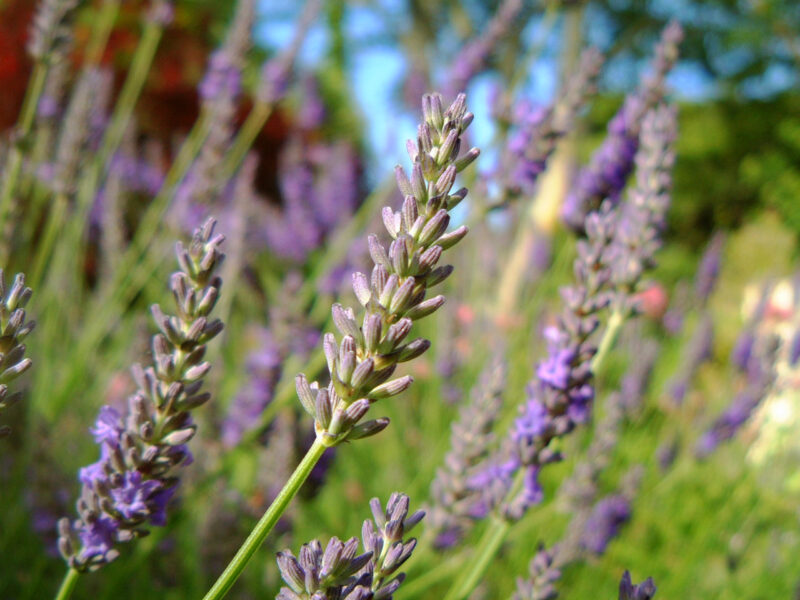
Parsley
Chickens love to eat all parts of the parsley plant and they enjoy both curly & flat varieties. It is loaded with vitamins A, B, C, E and K. Parsley is also a good source of calcium, iron, magnesium, selenium and zinc. Before keeping chickens, I had mostly thought of parsley as a decorative addition to a meal but it is actually very healthy! The high calcium can aid in egg laying and strong shells. The micronutrients and antioxidants help to build circulatory health for a healthy flock.
Super easy to grow, parsley will thrive in full sun and can even tolerate a little shade. Harvest parsley as needed and new leaves will quickly replace the old ones.
Calendula
Sometimes referred to as Pot Marigolds, calendula compromise about 15 species of herbaceous plants that are a member of the daisy family. Calendula is a favorite among gardeners (including me!) to tuck in between veggies to help repel insects. In the coop & nest box, they can also help repel insects.
The flowers are edible for both humans and chickens. For your chickens, eating calendula petals will give a lovely orange color to their yolks. They also will turn their beaks & feet a gorgeous, healthy color. Calendula is probably best known herbally for its healing powers. Like comfrey, calendula has been used for centuries for its healing properties. High in oleanolic acid, an anti-inflammatory, calendula also has anti-bacterial and antioxidant properties. Follow the instructions above to make a salve (just substitute calendula for the comfrey – or use both together!) to use on cuts and scrapes. Its anti-inflammatory properties make the salve a good fit for treating a prolapsed vent or helping an egg-bound hen.
Calendula is easy to grow from seeds, plant just after the last frost and they should flower from mid-summer to mid-fall. The more flowers you pick, the more will grow – so harvest often!
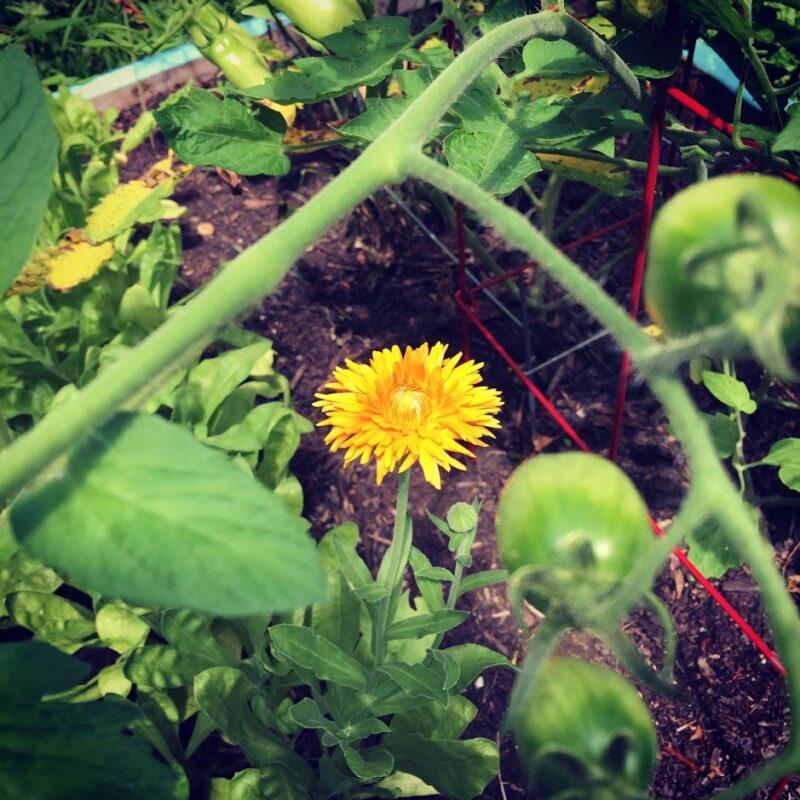
Thyme
Most aromatic herbs make great insect repellents because bugs dislike the strong smell. Thyme bundles hung around the run or sprinkled in the nest boxes are a great way to keep pests at bay. Lemon thyme has the added benefit of a citrusy smell that insects really dislike. Thyme can also act as a herbal antibiotic especially equipped to tackle respiratory infections, and has antibiotic & antibacterial properties. Adding thyme to your chicken’s feed can give them a great health boost.
Thyme does have a tendency to spread, so unless you want it everywhere it would be best to keep it in a container. If you have room for it to roam, thyme can make an excellent ground cover. Plant it in full sun with well-drained soil and watch it go!
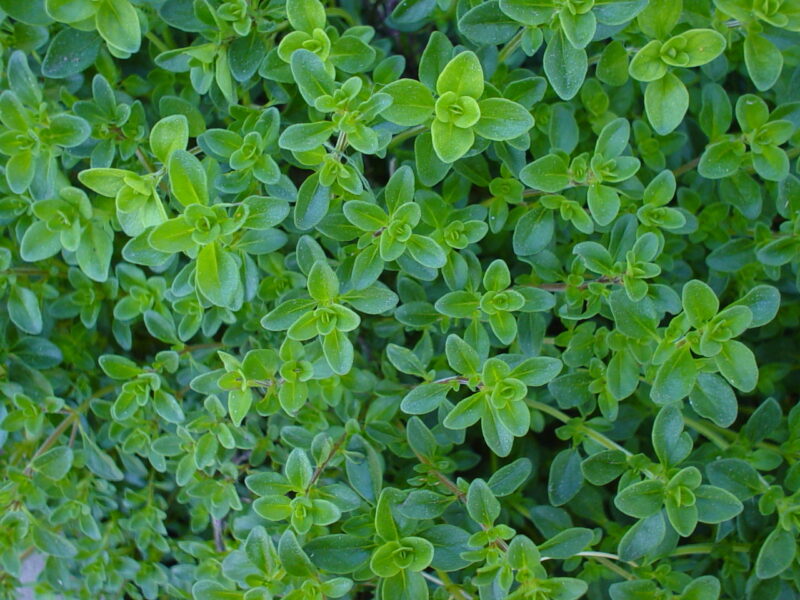
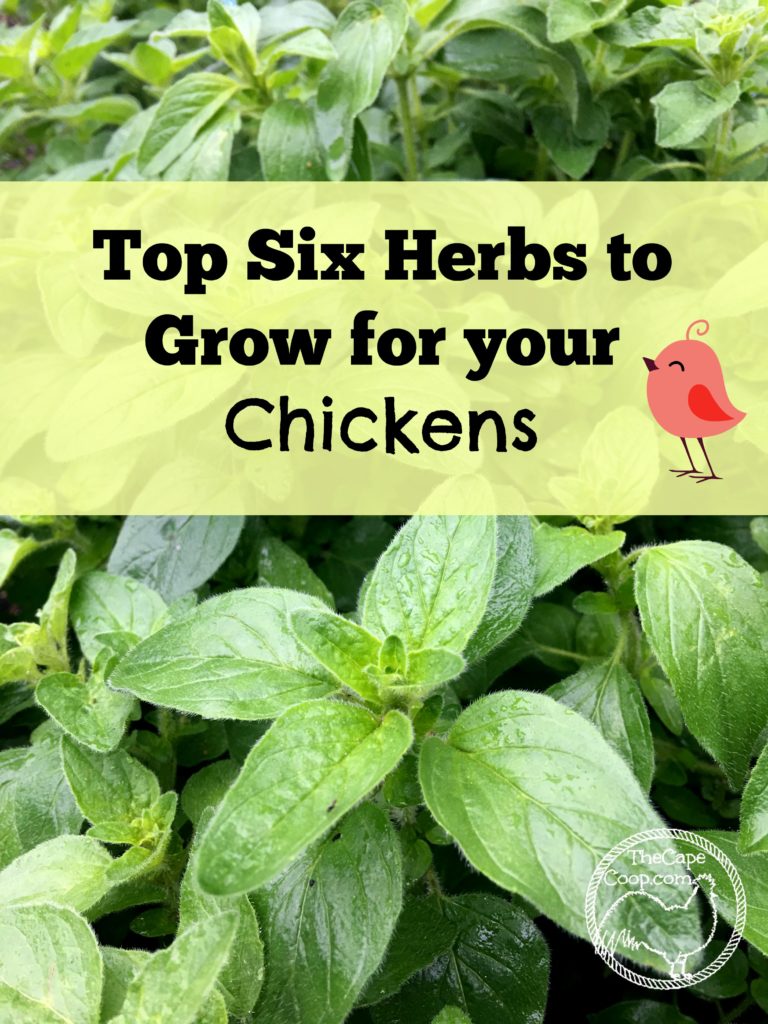



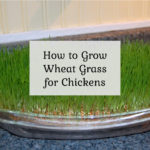

Joy
Thursday 13th of April 2023
This post is AWESOME as I am currently starting a garden and a coop to raise laying hens. I will definitely plant herbs for them and myself.
Liz
Sunday 16th of April 2023
Great! I am sure your girls will thank you for it!
Diaby
Sunday 4th of September 2022
I gave some fresh leaves of Moringa to mine every morning ..... please let me konw if that is good I do beacuse i had 6 trees of moringa in house ( Mali -Africa
Liz
Monday 5th of September 2022
Hi! Moringa doesn't grow where I live so I have never personally given it to my flock, but it is perfectly safe to use either fresh or dried. I would use it as a treat or supplement to their normal diet and not as a complete feed though
Charles
Monday 2nd of May 2022
We live on 1 acre and have raised free range chickens for about 12 years. We have lavender, oregano, and mint, but i’ve never seen them peck at it. However, they love to peck on kale, char, and collard greens through the garden fence. They also eat certain grasses and weeds that sprout up in winter and spring. They know what they like and we just let them eat what they like and what’s safe, but I’ve never seen them eat herbs like you describe. Maybe I’ll try planting a couple of the other things you mentioned.
Michele
Tuesday 19th of April 2022
I love this article. We are very new to chickens and will have them outside as soon as it warms up a bit more (in Iowa). I have lemon balm that grows prolifically in my garden. Is that good for chickens?
Liz
Tuesday 26th of April 2022
Yes! They love lemon balm and it is good for them :)
Rachel
Saturday 17th of July 2021
My chickens favorites are Oregano and Parsley. They will pick at the basil and thyme but not their favorite. I will put the basil flowers I pick off in their nesting boxes and it makes it smell so good. I've got Lemon Balm and Calendula growing for the first time this year. I haven't had good luck with mint or spearmint. I think spider mites are causing the problems